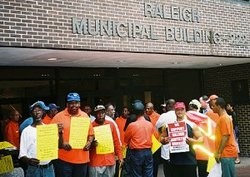50 Years Is Enough: NC public workers lobby for collective bargaining rights

Although private-sector employees in North Carolina have bargaining rights, state law specifically forbids collective bargaining by North Carolina's 650,000 public employees.
But North Carolina's public employees have not given up on gaining collective-bargaining rights in their state. For the past several years, labor rights' groups have come together in a growing movement to repeal N.C. General Statute 95-98, the ban that denies public-sector employees, including teachers, firefighters, sanitation workers and police officers, the legal right to negotiate any improvement in their working conditions through collective bargaining.
North Carolina is one of only two states (alongside Virginia) that legally prohibits recognition of public employee unions for collective bargaining. This summer marks the 50th anniversary of NCGS 95-98, and labor advocates say half a century is enough.
On Tuesday, labor rights' groups, public employees and supporters of collective bargaining rights gathered at the N.C. General Assembly in Raleigh to lobby for an end to the ban. During the lobby day, labor and civil rights advocates called on state lawmakers to pass North Carolina House Bill 750 and Senate Bill 427, pieces of legislation that would repeal NCGS 95-98 and grant public servants the same option to negotiate over wages, benefits, and working conditions that state law now gives to employees in the private sector.
Support for state legislation to repeal NCGS 95-98 has been building in the N.C. General Assembly and amongst the larger populace over the past few years as state, county and municipal employees have begun to organize. The North Carolina HOPE (Hear Our Public Employees) Coalition formed in 2002 as a broad statewide coalition of more than a hundred unions and labor groups working to win collective bargaining rights for public sector workers.
As the HOPE coalition explains on their Web page:
NCGS 95-98 makes it illegal for any agent of the State of North Carolina to enter into a contract with any bargaining agent chosen by public employees - essentially outlawing democracy at work. Public employees of state and local governments provide essential services to the citizens of North Carolina. Everyday these civil servants deliver for the people of our great state. It's time for our elected leaders to value their hard work by repealing NCGS 95-98 and standing up for democracy on the job. It's time for HOPE.
North Carolina has the lowest rate of unionization in the country — only 3.5 percent of the state's workers belonged to unions in 2008, according to the Bureau of Labor Statistics. The 50-year prohibition on collective bargaining for public-sector employees has no doubt contributed to the state's unionization rate.
Labor advocates point out that North Carolina's ban also violates international law. In 2007 the International Labor Organization, an agency of the United Nations, issued an unprecedented call for the United States to "promote the establishment of a collective bargaining framework in the public sector in North Carolina," and called specifically for the repeal of NCGS 95-98. The complaint charged the U.S. with failing to uphold its obligations as a member state of the ILO and failing to protect the internationally-recognized rights of public employees in North Carolina to freedom of association and collective bargaining.
A vestige of Jim Crow
NCGS 95-98 was passed in 1959 at a time when employers and lawmakers were trying to stamp down on organizing by the labor rights' and civil rights' movements. Historians today say NCGS 95-98 remains "North Carolina's last Jim Crow law."
As Dr. David A. Zonderman, a professor of history at North Carolina State University, explains at NC Policy Watch:
Here in North Carolina, we are going to celebrate a dubious golden anniversary this summer. Fifty years ago this June, spurred by fears of union corruption, communism, and (gasp) black and white people organizing together for better jobs and higher wages, the North Carolina legislature imposed a prohibition on public workers collectively bargaining for a legal contract-General Statute (GS) 95-98.
... North Carolina continues to cling to its ban on public sector collective bargaining; sharing with Virginia the dubious distinction of being the only two states with such a moth-eaten vestige of a red-baiting, race-baiting, union-bashing world that many Americans probably thought had gone the way of the Edsel.
Labor advocates say it's time for North Carolina to come into the 21st century. In an speech before the A. Phillip Randolph Institute last month, MaryBe McMillan, secretary-treasurer of the North Carolina State AFL-CIO, underscored that the bargaining ban is disrespectful to public employees of whom much is asked even as they are denied the same rights as mall security guards and workers at Walmart. McMillan told the audience that what the HOPE Coalition asks of state lawmakers is simple: "We ask not for a legal mandate. We ask not for the right to strike. We ask only for fairness."
